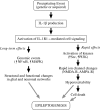New roles for interleukin-1 Beta in the mechanisms of epilepsy
- PMID: 17505552
- PMCID: PMC1867084
- DOI: 10.1111/j.1535-7511.2007.00165.x
New roles for interleukin-1 Beta in the mechanisms of epilepsy
Abstract
The mechanisms that transform a normal brain to an epileptic one are not fully understood. Interleukin-1 beta (IL-1beta) contributes to neuronal degeneration observed in several neurological disorders and recently has been implicated in neuronal injury that may accompany the process of epileptogenesis. This review presents the hypothesis that IL-1beta may contribute to the development of epilepsy via several mechanisms, including classical effects on neuronal survival and transcription pathways; novel rapid effects on receptor-gated ion channels; and long-lasting effects on expression of selective gene families. Thus, evidence that IL-1beta actions in epilepsy can be independent from the neurotoxic effects of this cytokine is presented.
Figures

References
-
- Allan SM, Tyrrell PJ, Rothwell NJ. Interleukin-1 and neuronal injury. Nat Rev Immunol. 2005;5:629–640. - PubMed
-
- Vezzani A, Granata T. Brain inflammation in epilepsy: experimental and clinical evidence. Epilepsia. 2005;46:1724–1743. - PubMed
-
- Pitkanen A, Sutula TP. Is epilepsy a progressive disorder? Prospects for new therapeutic approaches in temporal-lobe epilepsy. Lancet Neurol. 2002;1:173–181. - PubMed
-
- Jobe PC, Mishra PK, Ludvig N, Dailey JW. Scope and contribution of genetic models to an understanding of the epilepsies. Crit Rev Neurobiol. 1991;6:183–220. - PubMed
-
- Holmes GL. Seizure-induced neuronal injury: animal data. Neurology. 2002;59(suppl. 5):S3–S6. - PubMed
LinkOut - more resources
Full Text Sources
Other Literature Sources

